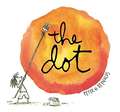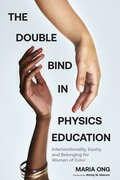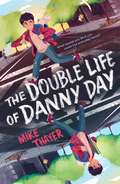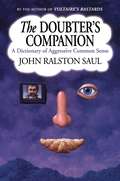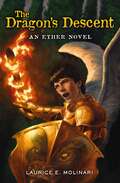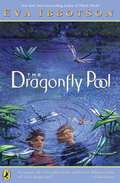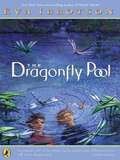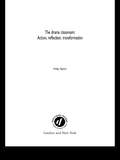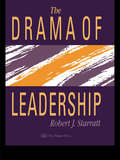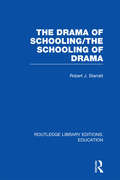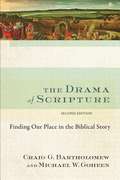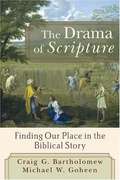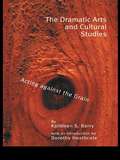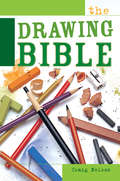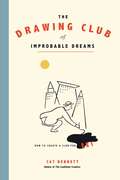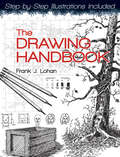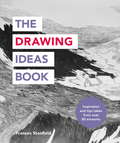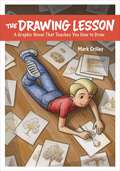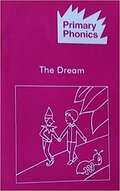- Table View
- List View
The Dot (Into Reading, Trade Book #12)
by Peter ReynoldsNIMAC-sourced textbook <p><p>Art class is over, but Vashti is sitting glued to her chair in front of a blank piece of paper. The words of her teacher are a gentle invitation to express herself. But Vashti can’t draw - she’s no artist. To prove her point, Vashti jabs at a blank sheet of paper to make an unremarkable and angry mark. "There!" she says. <p> That one little dot marks the beginning of Vashti’s journey of surprise and self-discovery. That special moment is the core of Peter H. Reynolds’s delicate fable about the creative spirit in all of us.
The Double Bind in Physics Education: Intersectionality, Equity, and Belonging for Women of Color
by Maria OngAn incisive study of the mechanisms reinforcing the underrepresentation of women of color in STEM fields and a call for systemic change to address the imbalance. In a detailed exploration of inclusion in physics, social scientist Maria Ong makes the case for far-reaching higher education reform, noting that despite diversity efforts to recruit more women and students of color into science and mathematics programs, many leave the STEM pipeline. The Double Bind in Physics Education takes readers inside the issue by following 10 women of color from their entrance into the undergraduate physics program at a large research university through their pursuit of various educational and career paths. Candid interviews with these women, their instructors and mentors, and their peers, conducted over 25 years, allow Ong to trace how pervasive challenges, such as navigating the intersectionality of race and gender discrimination, have shaped their academic opportunities and career choices. Despite the ideals of objectivity promoted in STEM disciplines, the women profiled here encounter continued patterns of systemic oppression within their departments. In their stories, Ong identifies overt behaviors and microaggressions that harass, exclude, and otherwise disadvantage women of color and members of other minoritized groups. Ong also shows how aids such as student support programs, peer groups, allies, and mentors, which are centered on the individual, can go only so far toward a sustainable solution. In order to provide equitable opportunities, she argues, greater work must be done to dismantle institutional norms and replace them with a culture of inclusion.
The Double Life of Danny Day
by Mike ThayerA boy who lives every day twice uses his ability to bring down bullies at his new school in Mike Thayer's humor-filled middle grade novel, The Double Life of Danny Day.My name is Danny Day, and I live every day twice.The first time, it’s a “discard day.” It’s kind of like a practice run. At the end of the day, I go to bed, wake up, and poof everything gets reset, everything except my memory, that is.The second time, everything is normal, just like it is for everyone else. That’s when everything counts and my actions stick. As you could probably guess, “Sticky Day” Danny is very different from “Discard Day” Danny.When Danny’s family moves across the country, he suddenly has to use his ability for more than just slacking off and playing video games. Now he's making new friends, fending off jerks, exposing a ring of cheaters in the lunchtime video game tournament, and taking down bullies one day at a time ... or is it two days at a time?
The Doubter's Companion: A Dictionary of Aggressive Common Sense
by John Ralston SaulA long and distinguished tradition of writers have used the form of a satirical dictionary to undermine the received ideas of their day. Voltaire wrote a sharply humorous "Philosophical Dictionary," while Samuel Johnson's dictionary of the English language was derisive and opinionated. These early dictionaries and encyclopedias were really weapons in a struggle for the soul of civilization between forces of humanistic enlightenment and the forces of orthodoxy and dogmatism. Their authors attacked and exposed the half-truths of their day by showing that it was possible to think differently about the social and political arrangements that everyone took for granted. But as John Ralston Saul argues in this decidedly unorthodox book, modern dictionaries have once again been captured by the forces of orthodoxy—albeit this time a rationalist orthodoxy. Our language has become as predictable, fragmented, and rhetorical as it was in the 18th century, divided as it is by special interest groups into dialects of expertise that are hermetically sealed off and inaccessible to citizens. In The Doubter's Companion, a marvelous subversive contribution to the great 18th century tradition of the humanist dictionary, Saul skewers and discredits the accepted content of common terms like Advertising, Academics, and Air Conditioning (defined as "an efficient means for spreading disease in enclosed public spaces"); Cannibal, Conservative, and Croissant; Dandruff, Death, and Dictionary ("opinions presented as truth in alphabetical order"); and several hundred others, including Biography ("a respectable form of pornography"), Museum ("safe storage for stolen objects"), and Manners ("people are always splendid when they're dead"). There is much in this volume that will stimulate, offend, provoke, perplex, and entertain. But Saul deploys these tactics of guerilla lexicography to advance the more serious purpose of reclaiming public language from the stultifying dialects of modern expertise.
The Doubter's Companion: A Dictionary of Aggressive Common Sense
by John Ralston SaulA long and distinguished tradition of writers have used the form of a satirical dictionary to undermine the received ideas of their day. Voltaire wrote a sharply humorous "Philosophical Dictionary," while Samuel Johnson's dictionary of the English language was derisive and opinionated. These early dictionaries and encyclopedias were really weapons in a struggle for the soul of civilization between forces of humanistic enlightenment and the forces of orthodoxy and dogmatism. Their authors attacked and exposed the half-truths of their day by showing that it was possible to think differently about the social and political arrangements that everyone took for granted. But as John Ralston Saul argues in this decidedly unorthodox book, modern dictionaries have once again been captured by the forces of orthodoxy--albeit this time a rationalist orthodoxy. Our language has become as predictable, fragmented, and rhetorical as it was in the 18th century, divided as it is by special interest groups into dialects of expertise that are hermetically sealed off and inaccessible to citizens. In The Doubter's Companion, a marvelous subversive contribution to the great 18th century tradition of the humanist dictionary, Saul skewers and discredits the accepted content of common terms like Advertising, Academics, and Air Conditioning (defined as "an efficient means for spreading disease in enclosed public spaces"); Cannibal, Conservative, and Croissant; Dandruff, Death, and Dictionary ("opinions presented as truth in alphabetical order"); and several hundred others, including Biography ("a respectable form of pornography"), Museum ("safe storage for stolen objects"), and Manners ("people are always splendid when they're dead"). There is much in this volume that will stimulate, offend, provoke, perplex, and entertain. But Saul deploys these tactics of guerilla lexicography to advance the more serious purpose of reclaiming public language from the stultifying dialects of modern expertise.
The Down and Up Fall
by Johanna HurwitzBolivia looks forward to new experiences as she starts middle school while spending six months with her great-aunt and uncle, but her friends Rory and Derek want to keep Bolivia all to themselves. Bolivia, Rory, and Derek are back together again! The three friends meet up when Bolivia's parents head off to Turkey and she goes to stay with her aunt and uncle in the same town where Rory and Derek live. Whether this irrepressible trio is coping with a mysterious rash, taking care of a litter of abandoned kittens, or getting drenched in a simulated classroom rain forest, there's no shortage of fun in store. But the biggest surprise of all comes when Bolivia befriends a girl named DeDe and a boy named Aldo. Then watch out! Rory's possessiveness may ruin everything, unless Bolivia can show him that it's possible to make new friends and keep the old. With this hilarious new book, Johanna Hurwitz completes her popular series that includes The Hot & Cold Summer, The Cold & Hot Winter, and The Up & Down Spring. You'll find these books and dozens more by this popular author in the Bookshare library.
The Dragon Drawing War: Targeting r Blends (Speech Bubbles 2)
by Melissa PalmerThis is a tale of two brothers, duelling to become a dragon drawing champion. Great skill and imagination must be used to become the victor! If you don’t succeed today, do not fear. There will be another war to fight tomorrow. This picture book targets /r/ blends and is part of Speech Bubbles 2, a series of picture books that target specific speech sounds within the story. The series can be used for children receiving speech therapy, for children who have a speech sound delay/disorder, or simply as an activity for children’s speech sound development and/or phonological awareness. They are ideal for use by parents, teachers or caregivers. Bright pictures and a fun story create an engaging activity perfect for sound awareness. Picture books are sold individually, or in a pack. There are currently two packs available – Speech Bubbles 1 and Speech Bubbles 2. Please see further titles in the series for stories targeting other speech sounds.
The Dragon's Descent (An Ether Novel)
by Laurice Elehwany MolinariEverything Vero has trained for in the Ether has led to this. In the third and final book of Laurice E. Molinari’s Ether series, the young guardian angel Vero is given the quest of locating the Book of Raziel—which was lost when Adam was forced to leave the garden of Eden. And not even Raziel himself knows where the book is now. It soon becomes clear, however, that Lucifer is intent on finding the book for his own means. When the C.A.N.D.L.E. library in the Ether is missing the information he needs, Vero, his sister, and his best friend, Tack, discover the clues to the book’s whereabouts may be right in front of them on Earth—and that Vero’s father’s new assignment in Sri Lanka may be no coincidence. As their quest begins in earnest, the lines between good and evil begin to blur. Vero will need to use every ounce of his training to take on not only the Devil and his hordes, but also Lilith, who may be lurking closer than anyone thinks.
The Dragonfly Pool
by Eva IbbotsonAt first Tally doesn't want to go to the boarding school called Delderton. But soon she discovers that it's a wonderful place, where freedom and self-expression are valued.
The Dragonfly Pool
by Eva IbbotsonTally Hamilton is furious to hear she is being sent from London to a horrid, stuffy boarding school in the countryside. And all because of the stupid war. But Delderton Hall is a far more unusual and interesting place than Tally ever imagined, and she soon falls in love with its eccentric staff and pupils. Now she's even organizing an exciting school trip to the kingdom of Bergania . . . although Tally never expected to meet the prince. Prince Karil hates his life at the palace and he is only truly happy when he escapes to the dragonfly pool, a remote spot in the forests of Bergania. Then Karil meets a feisty English girl who brings the promise of adventure. But his country is under threat, and the prince soon looks to his new friend Tally for survival as well as friendship . . .
The Drama Classroom: Action, Reflection, Transformation
by Philip TaylorHow can teachers incorporate drama into the curriculum?What drama activities are especially successful?How do teachers know when students are learning in, through and about drama?Teachers who are new to drama, or those wishing to refresh their knowledge and ideas, should find practical answers and guidance in this text. The book introduces the work of Cecily O'Neill to demonstrate the entry points to drama lessons, the pre-texts, and how educators need to introduce lessons with challenging material. He then uses the work of David Booth to highlight one aspect of drama - storydrama - and how it can be used as an effective learning medium across the curriculum.
The Drama Of Leadership
by Robert J. StarrattRobert Starratt, a teacher of people in leadership positions, presents the foundations for the theory of leadership. Based on a framework divided into building blocks, various concepts of leadership such as values, change, power and structure are explained and analyzed, and ways of incorporating them into school management are addressed. He presents a picture of leadership as a variety of disciplines - history, philosophy, psychology, politics, sociology, theology - amongst others, and with the idea that the student of leadership must be one of change.; This text is primarily intended for headmasters, education managers and administrators, students and lecturers in education and philosophers of education.
The Drama Years
by Haley Kilpatrick Whitney JoinerTODAY'S MIDDLE SCHOOL GIRLS HAVE IT ROUGH. In a few short years, they go through an incredible number of biological and emotional changes, making this the most formative--and riskiest--time in their lives. Groups turn on each other, a trusted childhood friend can reveal secrets by sending a text message or updating a Facebook status, and deciding where to sit in the cafeteria can be a daily struggle. As any tween will tell you, life for a middle school girl can be summed up in one word: drama. Haley Kilpatrick's own turbulent middle school experience inspired Girl Talk, a nonprofit organization in which high school mentors offer a "just been there" perspective to tween girls, helping them build self-esteem and develop leadership skills. Here, Haley delivers the definitive guidebook, packed with anecdotes from real girls around the country, who offer their insight into: Why her friends' approval is suddenly vitally important Why she feels pressured to be perfect Why she's no longer telling her parents everything What three vital things adults can offer to the girls in their lives to downplay the drama Filled with practical strategies from tweens and teen mentors to help adults understand what girls today are facing, The Drama Years is a must-read for anyone struggling to help girls navigate the often difficult transition into adolescence.
The Drama Years: Real Girls Talk About Surviving Middle School -- Bullies, Brands, Body Image, and More
by Haley Kilpatrick Whitney JoinerToday's middle school girls have it rough.In a few short years, they go through an incredible number of biological and emotional changes, making this the most formative--and riskiest--time in their lives. Groups turn on each other, a trusted childhood friend can reveal secrets by sending a text message or updating a Facebook status, and deciding where to sit in the cafeteria can be a daily struggle. As any tween will tell you, life for a middle school girl can be summed up in one word: drama. Haley Kilpatrick's own turbulent middle school experience inspired Girl Talk, a nonprofit organization in which high school mentors offer a "just been there" perspective to tween girls, helping them build self-esteem and develop leadership skills. Here, Haley delivers the definitive guidebook, packed with anecdotes from real girls around the country, who offer their insight into why her friends' approval is suddenly vitally important, why she feels pressured to be perfect, why she's no longer telling her parents everything, and what three vital things adults can offer to the girls in their lives to downplay the drama. Filled with practical strategies from tweens and teen mentors to help adults understand what girls today are facing, The Drama Years is a must-read for anyone struggling to help girls navigate the often difficult transition into adolescence.
The Drama of Schooling: The Schooling of Drama (Routledge Library Editions: Education)
by Robert J StarrattStarratt’s highly original book offers fresh insights into the nature of teaching, learning, schooling as a multi-cultural, social enterprise, and the importance of vision for that leadership—by using the analogy of drama. Schooling is a preparation to participate in the social drama, both as an individual and as a community. Beyond participation, schooling can enable youngsters to maintain and restore the human purposes of the social drama. This unique book accommodates present critics of schools from both the left and the right, but goes beyond them to offer a script for restoring the schools to their human and social purposes.
The Drama of Scripture: Finding Our Place in the Biblical Story (2nd Edition)
by Michael W. Goheen Craig G. BartholomewThe Drama of Scripture is written with first-year university students in mind. It is designed as a text for an introductory course in biblical theology taught at Redeemer University College in Ancaster, Ontario, Canada. The book helps students understand the true nature of Scripture and learn to articulate a thoroughly biblical worldview by systematically developing the most comprehensive categories of the Bible's story line: creation, sin, and redemption. The Drama of Scripture tells the biblical story of redemption as a unified, coherent narrative of God's ongoing work within his kingdom.
The Drama of Scripture: Finding our Place in the Biblical Story
by Michael W. Goheen Craig G. BartholomewThis book tells the biblical story of redemption as a unified, coherent narrative of God's ongoing work within his kingdom.
The Dramatic Arts and Cultural Studies: Educating against the Grain (Critical Education Practice)
by Kathleen S. BerryThis book presents a wide range of contemporary theories borrowed from Cultural Studies augmented with practical implications that support dramatic artists in their struggle to create possible multiple realities for a postmodern future. Teachers, directors, writers, students, and many others involved in the dramatic arts will benefit from the discussions of Cultural Studies and the connections to the Dramatic Arts. The first chapters mix theory and practice while the last chapter provides questioning strategies and conventions that can be used in actual sessions to deconstruct scripted or improvised dramatic texts. This is a useful introductory text for artists, directors, teachers, students, and others involved in the Dramatic Arts who would like to energize their work through contemporary theories and practices of Cultural Studies.
The Drawing Bible
by Craig NelsonThis is your complete guide to drawing--packed with everything you need to know about materials, techniques and drawing styles. Learn the secrets of rendering any subject correctly and creatively in an amazing array of mediums from pencil to full color. Quickly find the answers to common problems and questions so you can get back to the drawing board. The Drawing Bible is a handy, one-stop reference that beginners and experience artists simply can't be without! Learn How To: Master essential line and tone techniques Use proper perspective and proportions Create everything from quick sketches to impressive finished drawings Draw graphite, charcoal, pen and ink, colored pencil, pastel, and more
The Drawing Club of Improbable Dreams: How to Create a Club for Art
by Cat BennettThe Drawing Club of Improbable Dreams shows how to create a drawing club to work with fellow artists to build skills and find our own genius. In the club we make art experiments and the bold mistakes that free us from unnecessary limitations. We also reap the benefit of witnessing how others solve problems. Inside are full instructions on how to start and run a club as well as three 8-week session plans with specific art explorations. The purpose of the explorations we make is not only to build drawing skills but also to build the qualities of curiosity, courage, and critical thinking we need for making art. We will learn how to work from the inside out to make art that is fresh, vital and authentic. The book offers two important rules that will help us be the unique artists we are meant to be. As artists we dream that we might make something fantastic and be fully who we are. We dream that art matters, even that it might change the world. Improbable dreams but, in a club, things start to happen that we didn’t imagine possible. Working together we discover strength we might not have on our own. A club can take us to places we hardly dared to dream of and can show us how improbable dreams are where our hearts are truly meant to be.
The Drawing Handbook (Dover Art Instruction)
by Frank J. LohanDesigned for beginning and amateur artists, this guide to the essentials of drawing features comprehensive, easy-to-follow lessons and more than 500 detailed illustrations. Frank Lohan, a renowned artist and popular instructor, conducts readers through each step of the creative process, from grasping the concepts of perspective and proportion to producing lifelike drawings of a variety of subjects--landscapes, architecture, animals, flowers, and faces. Step-by-step exercises focus on attaining the fundamentals of composition, visualizing the geometry of the subject, working with perspective, and mastering drawing techniques for both pencil and pen and ink. Each exercise includes gridded outline compositions to help students develop their drawing abilities. Suggestions for the selection and use of tools will assist in achieving professional-quality results.
The Drawing Ideas Book
by Frances StanfieldRefresh your creativity and boost your motivation to draw with the expert help of The Drawing Ideas Book.If you're stuck in a rut - or simply just stuck - this book is filled with ideas for what to draw, how to draw and even where and when to draw. Packed with arresting examples of creatives' drawings and sketchbooks from all over the world, it's sure to fire up your creativity.Imagine it, doodle it, sketch it, ink it and more. Discover the infinite possibilities of this essential art form, from its key mediums to unusual processes, across subjects from figure drawing and landscape sketching to abstract compositions.
The Drawing Ideas Book
by Frances StanfieldIf you're stuck in a rut - or simply just stuck - this book is filled with ideas for what to draw, how to draw and even where and when to draw. Packed with arresting examples of creatives' drawings and sketchbooks from all over the world, it's sure to fire up your creativity.Imagine it, doodle it, sketch it, ink it and more. Discover the infinite possibilities of this essential art form, from its key mediums to unusual processes, across subjects from figure drawing and landscape sketching to abstract compositions.
The Drawing Lesson: A Graphic Novel That Teaches You How to Draw
by Mark CrilleyRead This Comic and Start Drawing Today! Nominated for a 2017 Eisner AwardFor the first time ever, drawing instructor and graphic novelist Mark Crilley brings his easy-to-follow artistic instruction to aspiring artists in the form of a comic book, providing you with a one-of-a-kind how-to experience. In The Drawing Lesson, you&’ll meet David—a young boy who wants nothing more than to learn how to draw. Luckily for David, he&’s just met Becky—his helpful drawing mentor. Page by page, Becky teaches David (and you!) about the essential fundamentals that artists need in order to master drawing, all in a unique visual format. In panel after panel, Crilley provides lessons on shading, negative space, creating compositions, and more, with accompanying exercises that you can try for yourself. Are you ready to start your drawing lesson today?
The Dream (Primary Phonics #Set 3 Book 5)
by Barbara MakarA systematic, phonics-based early reading program that includes: the most practice for every skill, decodable readers for every skill, and reinforcement materials--help struggling students succeed in the regular classroom
